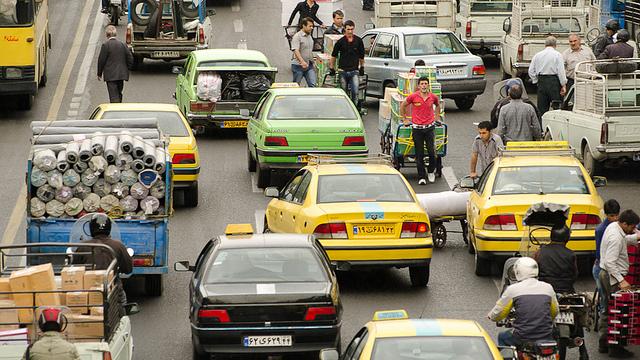The NJ governor’s staff aren’t the only politicos messing with traffic
New Jersey Governor Chris Christie was in the headlines this week when emails were leaked linking his staff to an abrupt closure of access lanes to New York City's George Washington Bridge. The move created gridlock in Fort Lee, NJ — whose mayor didn't support Christie's re-election bid.
“Time for some traffic problems in Fort Lee,” wrote Bridget Anne Kelly, a deputy chief of staff to Gov. Christie, in one of the leaked emails.
Politics aside, traffic is inherently aggravating around the world. Still, politically-motivated traffic, well, that's not just a New Jersey problem, either.
In Egypt, says Financial Times correspondent Borzou Daragahi, many people suspect the security forces, the police, the judiciary and even people in the public works ministries have messed with the infrastructure of the country. In some cases in the past, h says, "Setting up really annoying check points that clogged traffic and made people angry in order to foment discontent that would ultimately lead to the overthrow of the government."
Manipulation of traffic is prevalent across the Arab world, claims Daragahi. There's even a radio show in Algeria where people call up just to complain about traffic and government incompetence.
"They're treading a very fine line when they talk about traffic, which has connotations way beyond just getting from point A to point B," says Daragahi.
Reporter Thanassis Cambanis in Beirut, Lebanon, says in the Mideast, you can gauge the strength of various politicians by looking at a roadmap.
"If you've got a place where the ruler has a country home, then that's where you get a fantastic road," Cambanis says. Or if, say, "you want a road from the capital to the coastal town in Lebanon where a warlord likes to sail his yacht from."
The World's Gerry Hadden, who is based in Barcelona, says road construction is highly politicized in Spain, too, where politicians have tried to consolidate their empires by building highways — even if those roads rarely see traffic. Hadden describes a road in the Castellon region that runs nine miles from the Mediterranean coast to a "phantom airport" that has never seen a plane land.
"That highway was built, many people allege, by the political leaders over the last 10 years or so simply as a means of spreading around taxpayer money among their construction buddies and, at the same time, allegedly getting kickbacks themselves," Hadden says. "That highway still stands, glistening in the sun with barely a car moving on it."
Roads everywhere, it seems, run directly to political power. Oh, and one more perk of power … avoiding the traffic.
In India, says journalist Rhitu Chatterjee, politicians seem to be above traffic, using a flashing light or 'red beacon' on their cars and siren to cut through gridlock.
"Very, very often you'll see traffic stopping and making way for politicians and bureacrats in their cars," Chatterjee says. It has gotten so bad that New Delhi's chief minister, Arvind Kejriwal, has pledged to stop this practice. Some members of his cabinet have even pledged to start taking public transportation, according to Chatterjee.
